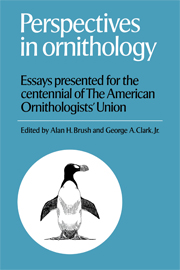 Perspectives in Ornithology
Perspectives in Ornithology Book contents
- Frontmatter
- Contents
- List of contributors
- Preface
- Introduction
- 1 Captive birds and conservation
- 2 Research collections in ornithology – a reaffirmation
- 3 On the study of avian mating systems
- 4 Cooperative breeding strategies among birds
- 5 Ecological energetics: what are the questions?
- 6 Perspectives in optimal foraging
- 7 Biochemical studies of microevolutionary processes
- 8 Organization of the avian genome
- 9 The origin and early radiation of birds
- 10 Avian community ecology: an iconoclastic view
- 11 Biogeography: the unification and maturation of a science
- 12 Bird song learning: theme and variations
- 13 Bird navigation
- Index
5 - Ecological energetics: what are the questions?
Published online by Cambridge University Press: 04 August 2010
- Frontmatter
- Contents
- List of contributors
- Preface
- Introduction
- 1 Captive birds and conservation
- 2 Research collections in ornithology – a reaffirmation
- 3 On the study of avian mating systems
- 4 Cooperative breeding strategies among birds
- 5 Ecological energetics: what are the questions?
- 6 Perspectives in optimal foraging
- 7 Biochemical studies of microevolutionary processes
- 8 Organization of the avian genome
- 9 The origin and early radiation of birds
- 10 Avian community ecology: an iconoclastic view
- 11 Biogeography: the unification and maturation of a science
- 12 Bird song learning: theme and variations
- 13 Bird navigation
- Index
Summary
A major basis of modern biology is the recognition that organisms represent temporary and complex associations of molecules that are maintained and reproduced only by expenditure of energy. Associated with this power consumption, organisms are involved continuously in internal energy transformations and exchange of energy with their environment. Two biologically important classes of energy are chemical potential energy, particularly that liberated by oxidation of carbon or hydrogen, and random kinetic energy at the molecular level, which is equal to heat content and proportional to temperature. These types of energy are interrelated in animals in complex ways. All work accomplished by conversion of chemical potential energy necessarily is inefficient and results in metabolic heat production. All chemical reactions, including the biochemical reactions of catabolism and synthesis, produce changes in the heat content of a system. In turn, heat content is proportional to organismal temperature, which is a critical determinant of metabolic performance. Therefore, it is impossible to segregate neatly problems of thermal balance from those related to the acquisition and allocation of chemical potential energy. For the purposes of the following discussion, however, I have attempted at least a rough division. I will initially discuss questions related to thermal energy as an important property of the physical environment; such questions are most directly pertinent to regulation of the bird's body temperature. Second, I will discuss questions related to the acquisition and allocation of chemical potential energy as a vital resource.
- Type
- Chapter
- Information
- Perspectives in OrnithologyEssays Presented for the Centennial of the American Ornitholgists' Union, pp. 135 - 164Publisher: Cambridge University PressPrint publication year: 1983
- 16
- Cited by


